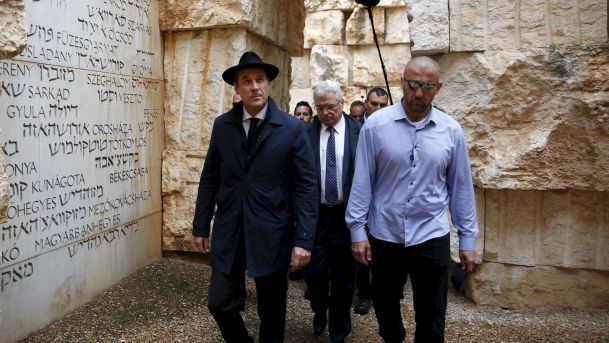Likud Lawmaker Meets With Far-right Austrian Leader Despite Official Israeli Policy
Israel views the Austrian Freedom Party as a racist faction with neo-Nazi elements within it. MK Avi Dichter, after meeting with its leader Heinz-Christian Strache: 'Most of the Arabs I've met are also not my cup of tea.'

The leader of the extreme right-wing Austrian Freedom Party, Heinz-Christian Strache, on a visit to Israel this week, met with MK Avi Dichter (Likud), Haaretz learned from David Lasar, who is close to Strache and was present at the meeting. The meeting took place on Wednesday in Ramat Gan, despite the Foreign Ministry's policy to boycott the visit.
Dichter told Haaretz that the meeting with Strache only dealt with the fight against terrorism. "They wanted to know how we deal with terrorism," he said. "It was an interesting meeting." The Likud lawmaker noted that he did not consulted with the Foreign Ministry or the Prime Minister's Office before agreeing to meet with Strache.
"I'm not a member of cabinet, I'm Member of Knesset and if I want to meet someone I decide it myself," he added. "I'm the son of Holocaust survivors and I'm in touch with quite a few people whose opinions I don't like. Most of the Arabs I've met are also not my cup of tea," Dichter, a former Shin Bet chief, said. "I think it's not easy to decide to refrain from meeting with someone who could be the next Austrian Chancellor - [Even] with his past – there should be a good reason for that.
Strache, who arrived in Israel on Monday night, told Channel 1 TV on Wednesday that he had met with government ministers during the course of his visit, but declined to mention names, saying that he had promised confidentiality. The Foreign Ministry announced on Strache’s arrival that he was not here as a guest of the government, and that the government had no connection with the visit.
In fact, Strache was invited to Israel by the Likud party. The official invitation, which Strache posted on his Facebook page, was signed by Eli Barda, head of the Likud’s foreign relations department. The guest’s escort in the country, and the one who set up his meetings, was former MK Michael Kleiner, president of the Likud tribunal. Also involved in the visit and the organization of meetings was former minister Rafi Eitan. Kleiner confirmed to Haaretz that Strache had met with government ministers, but he too refused to identify them, emphasizing that the meetings were of a personal nature.
Haaretz has learned that the event at which Strache met Likud ministers was a reception in his honor on Tuesday night, at the Herzliya Pituach home of David de la Rosa, former Colombian ambassador in Israel. A source familiar with the details of the event noted that Kleiner invited several Likud ministers and lawmakers to the event. Some responded favorably and were in attendance that evening.
Strache is the heir and one-time disciple of Jörg Haider, the late leader of the Austrian Freedom Party, notorious for his anti-Semitic attitudes and support for Nazism. When his party joined the Austrian government in 2000, Israel recalled its ambassador from Vienna in protest; the diplomatic crisis was not resolved until 2003.
The Israeli government views the Freedom Party as a racist party, tainted by anti-Semitism and xenophobia, and even including neo-Nazi elements within it. The official policy of the Foreign Ministry toward the party is one of complete sanction, and it bans meetings between government representatives and party members. For example, former president Shimon Peres rejected Strache’s request for a meeting in light of the unequivocal opposition of the Foreign Ministry, believing that such a meeting would grant legitimacy to the visit.
In recent years, some Israeli right-wingers, among them West Bank settler leaders, have pushed for a change in policy toward Strache and his party. Their primary rationale is his anti-Muslim views and support for Israeli settlement-building. Strache’s supporters in Israel argue that the Foreign Ministry’s attitude toward the Austrian leader and his party is wrong, outdated, and based on ignorance.
Want to enjoy 'Zen' reading - with no ads and just the article? Subscribe today
Subscribe now



















